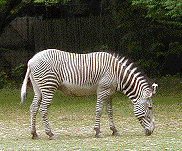
Dretske is a fan of the Relevant Alternatives Theory. He thinks it does a good job of explaining his Gadwall duck/grebe case. In that case, you see a bird that has all the markings of a Gadwall duck--and in fact it is a Gadwall duck. Do you know that it is? Dretske says that depends on whether there are relevant alternatives to its being a Gadwall duck. For example, one alternative hypothesis might be that there is a species of grebe around which has the same markings. (A grebe is a kind of bird that looks like a duck but isn't. Here are some pictures.) If the grebe alternative is relevant, Dretske thinks, then you don't know that the bird you see is a Gadwall duck. But if it's not a relevant alternative, then you can know.

Dretske gives a similar kind of case in another paper, "Epistemic Operators." In that case, you're at the zoo, and in the pen in front of you is a striped horse-like animal. The sign on the pen says "Zebra." Do you know that the animal is a zebra? (Assume that in fact it is a zebra.) Dretske says: Well, what about the possibility that it's just a mule painted to look like a zebra? Do you really know that the animal is not a cleverly-disguised mule? You may have some reason to believe that it's not a cleverly-disguised mule. (Zoos don't typically try to fool people like that.) But your evidence doesn't seem to be good enough to know that it's not a cleverly-disguised mule. You haven't made any special tests, or anything like that. So Dretske thinks you don't know it. But he still wants to say that, so long as the mule hypothesis is not a relevant alternative, you can know that the animal in the pen is a zebra.
Now the important question is: What determines when a possibility counts as "relevant"? Does the subject have to know about the grebe possibility, or the painted-mule possibility, for them to be relevant? Dretske doesn't think so. He thinks alternatives can be relevant for you, and can keep you from having knowledge, even when you haven't come across any evidence that they're true. Perhaps it's enough if there's some suspicious ornithologist poking around in the neighborhood, who does have evidence there are grebes in the area.